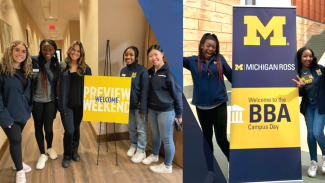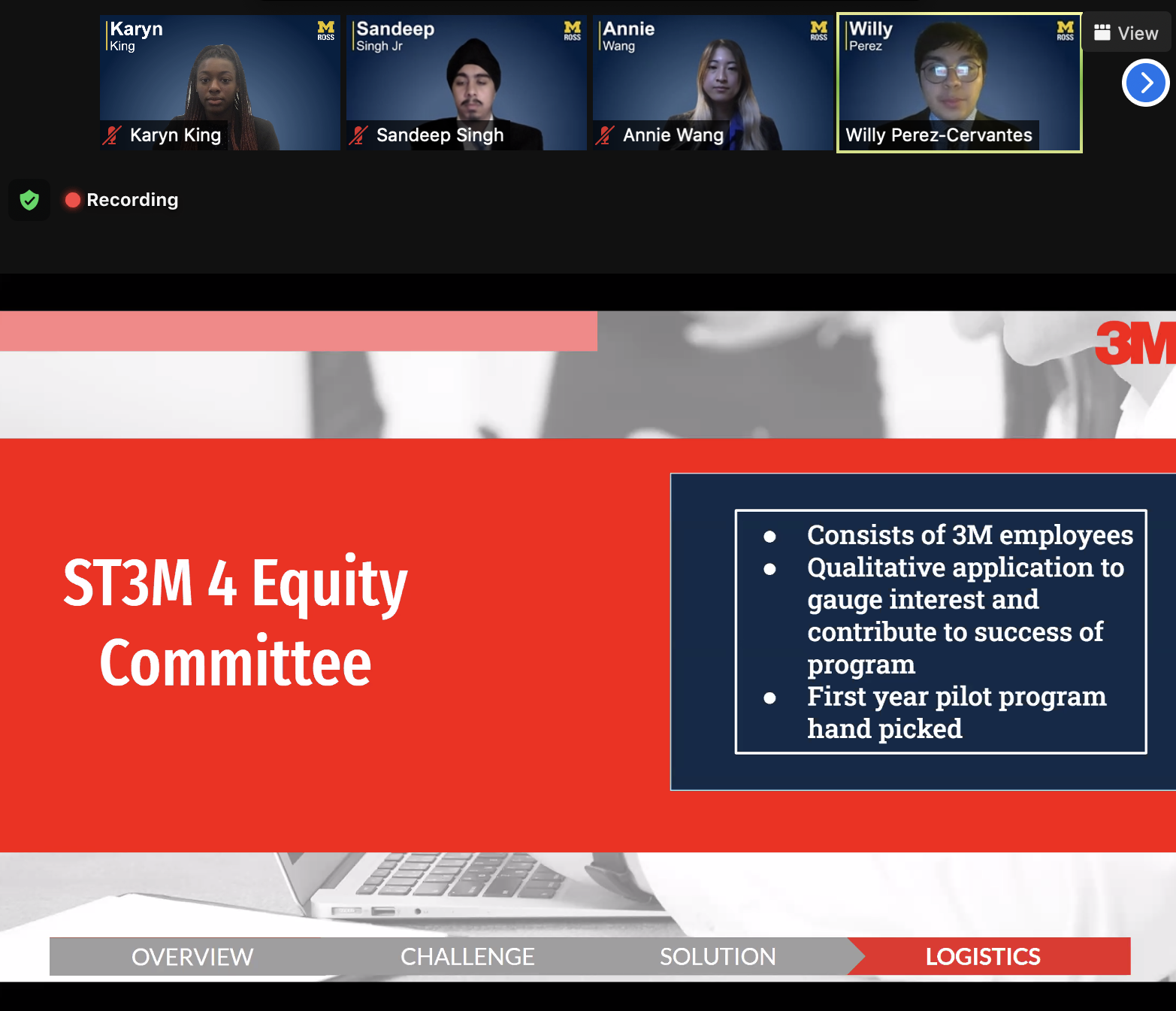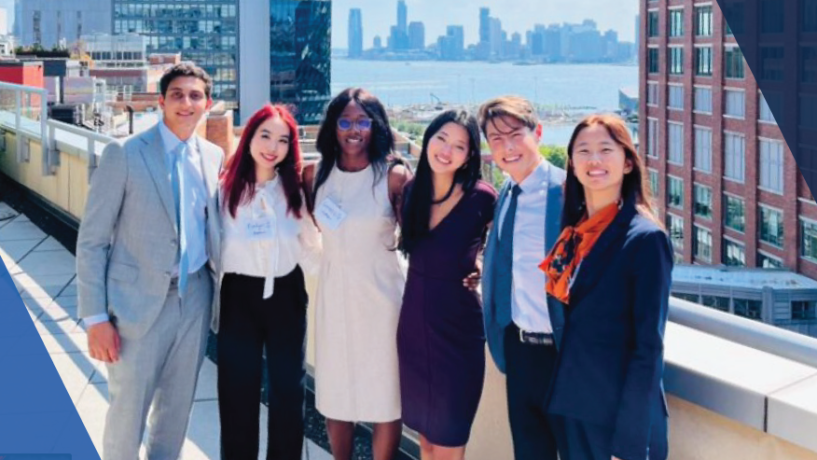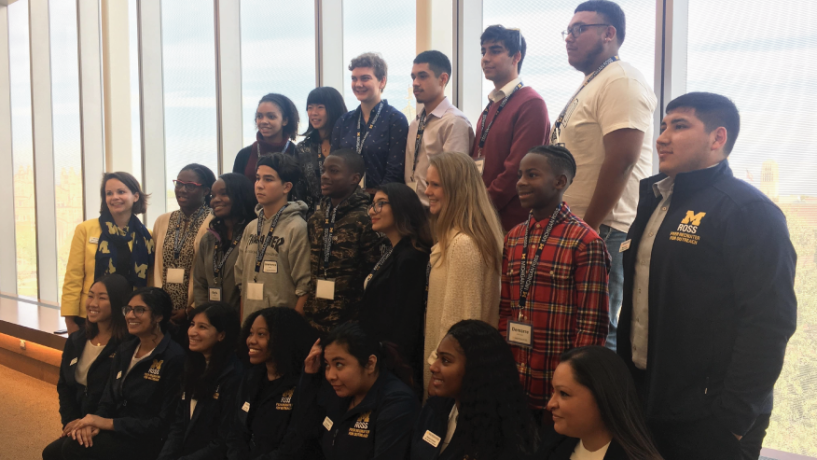How I Followed My Own Pace and Tackled Imposter Syndrome To Succeed in a Rigorous Academic Environment

Coming into the Ross School of Business as a first-year student, I did not realize the internal tug of war I would have about what would deem me a “successful” student.
My background

I’m originally from Flint, Michigan, and I came to Michigan Ross as the only student from my high school to attend the business school. So, initially, I didn’t know what to expect from being in a rigorous program and how to navigate the social culture that revolved heavily around clubs. Due to this, I, like many others, felt that I didn’t belong and that a mistake was made in the admissions process. I thought “how was I — an African American, lower/middle class woman from a diverse high school program where I wasn’t the minority, supposed to succeed, be confident at, and contribute to a predominately white institution where the average household income was significantly higher than not only all of the University of Michigan, but the entire state of Michigan as well.
I had extreme imposter syndrome.
Not only did I have imposter syndrome, but I allowed it to control my perception of myself and constantly fed the continuous cycle of doubt by focusing on all of the things that I didn’t know instead of my capabilities. Back then, I could readily tell you all of the things that I thought I was bad at and all the things that I didn’t know, such as: I knew nothing about business; I was a bad public speaker (I felt like my throat was caving in on itself every single time I tried to speak to anyone); I didn’t feel smart enough to participate in class; and to top it all off, I didn’t even know that almost all the clubs in college required dues.
I didn’t realize until later on the unique strengths I carried, such as: I had a great support system in my family, my academic advisor, and in the Academic Success Center where I met amazing people that continue to support me to this day. They told me I was doing really well my first semester, that I studied hard, and most importantly, I had a unique story to tell and a background that none of my peers had.
As I reflect on what has led me to where I am now, I’ve realized that throughout the years I’ve been able to gain valuable lessons through pushing myself out of my comfort zone at my own pace.
Finding my values
Being disoriented my first year allowed me to join clubs that I was passionate about because I — unlike some of my classmates — didn’t join 10 other clubs that I really wasn’t interested in or that I would only join because others wanted to be in it. Instead, I joined an educational club to teach me about all of the different areas of business; the BBA Council’s DEI Committee because not only were there people who looked like me in that club, but they were also making important changes within our community; and I became a BBA ambassador to encourage the next generation to come to Ross (especially those who come from similar backgrounds) and to also work on my public speaking skills. By joining these organizations and also being able to attend career-based treks to Detroit and Chicago in my second semester, I was able to appreciate the pace I was going and realize my personal values. Knowing my values, and the fact that others around me didn’t hold the same values, reduced that feeling of impostor syndrome because I knew that since we had different perspectives our journeys were also going to be distinct. This awareness became a game changer for me.
Gaining confidence
 Sophomore year was in the midst of COVID-19, so I was at home taking virtual classes. If you’ve ever done that, you know how challenging and unmotivating that can be. So, within this time, I really pushed myself academically to keep busy. Not only did my core classes start for Ross, but I took spring classes at U-M, and took three out of four floating core classes that all Ross students are required to take. Additionally, one of the activities that I was most grateful for in that year was participating in my first-ever case competition, the National Diversity Case Competition.
Sophomore year was in the midst of COVID-19, so I was at home taking virtual classes. If you’ve ever done that, you know how challenging and unmotivating that can be. So, within this time, I really pushed myself academically to keep busy. Not only did my core classes start for Ross, but I took spring classes at U-M, and took three out of four floating core classes that all Ross students are required to take. Additionally, one of the activities that I was most grateful for in that year was participating in my first-ever case competition, the National Diversity Case Competition.
I was able to join a team of three other BBA students who had experience in case competitions. I was nervous, but I also learned a lot about critical thinking, creativity, and staying cool under pressure. All of these factors were directly related to everything I was facing in my classes and that I would face in my career. By starting to work on those cognitive skills, I was able to gain confidence in a multitude of spaces.
Using my voice
Beginning junior year, I was able to see more of the effects of my efforts because it was the first time we were back in person since my first year. Multiple people came up to me telling me how I participated a lot in class, which was huge for me as someone who used to be anxious each time I spoke in class that first year. I also was able to build amazing relationships in the on-campus jobs I held, and I had the ability to make a career interest pivot by taking charge of my future and by saying “no” to things I no longer wanted to be a part of.
Using my voice to shape my experience was a pivotal moment because I am where I am today because of it. And, I’ve been able to use my voice for others, too, through mentorship and pushing initiatives on the DEI Committee, which has been very impactful to me.
Being equipped to give back
Knowing what my values are, having the confidence to live by them, and being able to use my voice to act has led me to being who I am. This is who I have become because of my unique journey: I am the director of recruitment for the DEI Committee, a co-chair with two other MBAs for the Sanger Leadership Center’s Leader Experience program, a BBA ambassador and outreach ambassador, a Ross Academic Peer Advisor, and a mentor for the Academic Success Center’s Ross Summer Connection program.
After college, I will be going into consulting. I am honored, proud, and blessed to be a part of the Ross community and to have the opportunity to give back in the positions I’m involved in by being someone who has created her own path, at her own pace, to become my own definition of successful.







